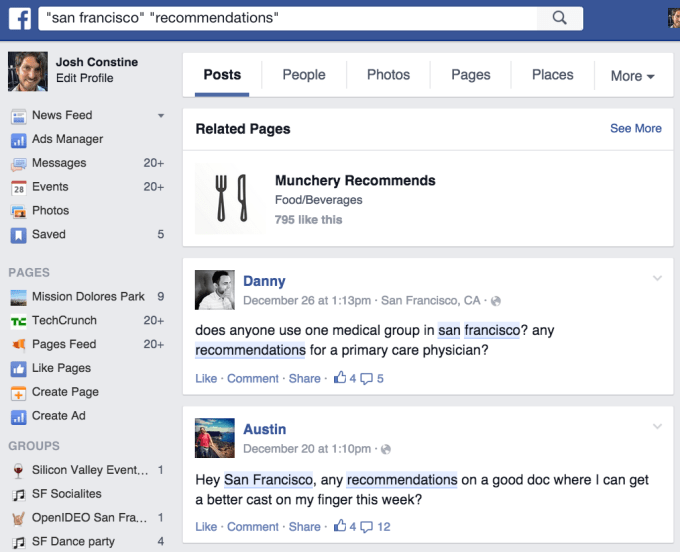Yet the news cruised by with analysis focused simply on what Facebook’s new keyword post search does today. Yes, any post by you or any of your friends can now be dug up with a quick search from mobile. But I don’t think people realize how big a deal it is for tomorrow. Facebook just went from data rich to Scrooge-McDuck-swimming-in-a-tower-full-of data rich.
The ramifications for advertising, developers, and Facebook itself are tough to fathom. Our most vivid doppelgänger, our digital echoes can now be tracked. They don’t just say who we were, but where we’re headed, and what we’ll want next.
First, the trillion post index gives us group memory.Each person can only search stories from their friends and surrounding network, but Mark Zuckerberg recently said those all add up to over 1 trillion posts.
If your friends put their lives on Facebook, you can now remember them too. You could say these are just faded snapshots, nowhere near the real thing, but how much of our own lives do we forget completely? Search yourself and almost any word, and you’ll likely discover scenes from your own past that you didn’t find worth saving locally.
If we know existence is too rich for us to record everything in our minds, and accept that Facebook posts are merely hints or triggers of long-gone moments, we can augment our memories without the guilt that we’re replacing them.
But this is not the Facebook Timeline. Since 2011, we’ve been able to dive into one friend’s grand narrative. But minus the creepiest of us, few aimlessly dig so deep. Post search weaves different lives together by the virtue of the words chosen to describe them. What does “fun” or “love” or “worried” conjure from different perspectives within our network? This is a question we can suddenly answer.
See my hands-on with Facebook post search for eight helpful ways to use the feature

Second, you could say Facebook knew a lot about us before, but didn’t understand it until now, like a student with the facts memorized who finally learned how they piece together into history.
Facebook’s product depends on guessing what we want based on who we were. Before, that meant who we said we were, which friends we communicated with, what we liked, and where we browsed. Now, to Facebook, we’re also what we said, and that says a lot.
Most obviously, the News Feed could learn to mimic our external dialogue, showing us posts with similar content to what we spread. Never talk about sports or babies? Facebook could eventually filter those out of your feed. Just shared your thoughts on Syria, celebrity gossip, or the police state? The algorithm could pull an audible and show you more about related news.
Suggested Friends. Suggested Events. Suggested Pages to Like. Facebook was previously going on some taps and a top-level view of your identity. Now it has a much more intimate impression of who we are.
Developers could eventually get a better understanding of us too. Imagine a Facebook post search API. One that could bring the ability to at least recall your own posts to other apps. It doesn’t exist now, but Facebook is eager to equip developers with personalization tools in hopes they’ll buy or host its ads.
With reams of what we’ve written, everything stands to get a lot more relevant
Read More
Comments
Post a Comment